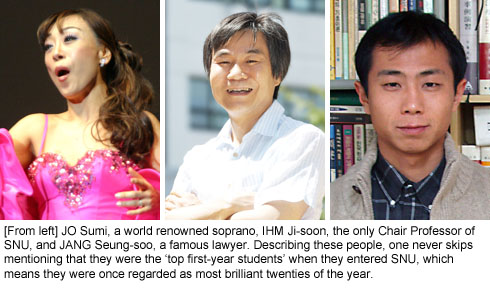On December 20, SNU announced that it has abolished a school charter article that states a special prize be given to students who took top place on the entrance examination.
From the beginning of its history, SNU's presidents have awarded a full tuition scholarship and a certificate of distinction to new students with the highest score from each college. At the entrance ceremony held every year at the beginning of March, one of the top students had the honor of taking an oath as the representative for all the matriculating students.
Furthermore, the honor of entering SNU as a top student was considered a lifelong, tremendous distinction that caught nationwide attention since it meant being the smartest of all the brightest students accepted into SNU, the most prestigious school in Korea. The list includes Soprano JO Sumi, the late civil rights lawyer JO Young-rae, and politicians such as WON Hee-ryong and CHUN Jungbae among many others.

In the past, the criteria for admission to SNU were simple and uniform standards such as applicants' scores from the College Scholastic Ability Test, the Korean SAT.
In recent years, however, SNU has included more factors including, for example, volunteer activities, in an effort to evaluate applicants based on a more multi-faceted, flexible system.
In addition, there are now multiple special screening processes besides general admission, for example special admission for students coming from rural areas and for students with special talents. All this has made it harder to rank the accepted students according to a single standard.
SNU explains that this decision does not only reflect the diversification of its acceptance policy, but also a new trend in scholarship criteria: more and more scholarships have been given on the basis of financial need rather than grades.
Many believe this shift from a merit-based to need-based policy will better serve the true purpose of scholarship grants, especially when about 4 out of 10 newly admitted SNU students are from the top 10 percent income-tier families in the nation. Many experts believe this recent trend is linked with the reality in which most students seek help from expensive private tutoring to get into a good college.
"SNU has been increasing its efforts to accept more high-potential, well-rounded students and less one-dimensional, good testers. Also, SNU believes more scholarship funding should go to those students who need the money most," says an official from SNU.
While some might miss SNU's almost-70-year-old tradition of top freshman awards, SNU and many others think abolishing the tradition is a proper reflection of SNU's present-day transition.
Written by LEE SuKyoung, SNU English Editor, sukyoung123n@gmail.com
Reviewed by Eli Park Sorensen, SNU Professor of Liberal Studies, eps7257@snu.ac.kr
Proofread by Brett Johnson, SNU English Editor, morningcalm2@gmail.com

